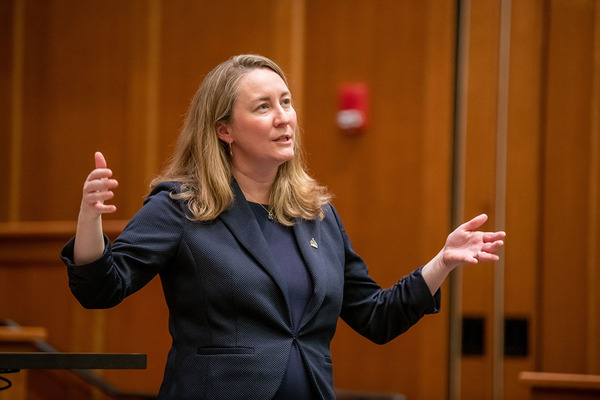The face-off between powerful corporate interests and the Delaware Court of Chancery over proposed changes to the state’s corporate code has taken on a new sense of urgency this week as amendments are now under consideration in the General Assembly as Senate Bill 313.
In what is perhaps the most direct intervention into Delaware’s legislative process in recent memory by the Court of Chancery, the court’s top judge said that proposed legislation amending the corporate code has been rushed and that the magnitude of the changes demands more time for hearings and debate.
The remarks, made by Chancellor Kathaleen McCormick in a private letter to the Delaware State Bar Association last month when it was drafting amendments to the corporate code, mark yet another departure from tradition in this nearly-unprecedented corporate amendment process playing out in Delaware, the self-proclaimed “corporate capital” of the United States, where two-thirds of Fortune 500 companies call home. The contents of McCormick’s letter were made public yesterday by The Chancery Daily, a newsletter reporting on proceedings in the Court of Chancery.
In the letter, McCormick called the amendment process “flawed” and blasted the state bar for fast-tracking amendments that would substantively alter Delaware corporate law while litigation is still pending in the judiciary.
“The Proposal was not the product of a cautious and deliberative process. The Proposal is not targeted in scope or uncontroversial. The Proposal does not address Delaware Supreme Court decisions,” Chancellor McCormick wrote to the DSBA on April 12. “Quite the opposite. The Proposal was the product of a rushed reaction . . . The Proposal has moved forward at a pace that forecloses meaningful deliberation and input from diverse viewpoints. It reflects the broadest set of substantive amendments since the 1960s. It is controversial. It preempts the Delaware Supreme Court’s opportunity to act as the final arbiter of Delaware law, striking at two cases still being litigated before the Court of Chancery.”
Why the rush?
First, McCormick says proponents of the amendment claim it will align Delaware law with “market practice,” which she acknowledges is sometimes a legitimate concern, although an unconvincing one in this case: “The fact that ‘everyone is doing it’ is not a reason to do something. The question is whether everyone is doing the right thing: Is the market acting in a manner that is good for corporate law?”
The second purported justification for rushing the amendments that McCormick calls out in her letter is the notion that recent decisions by the Court of Chancery have made Delaware’s corporation law “unpredictable,” but this claim she too finds doubtful.
“Reasonable minds can dispute that premise,” she wrote. “More importantly, reasonable minds can dispute whether the Proposal achieves the intended purpose of predictability or the opposite.”
By “the opposite,” McCormick may have been referring to criticism that the legislation includes several dubious loopholes that could upend Delaware’s board-centric model of corporate governance, where directors are the ultimate fiduciaries of a corporation and are voted on by shareholders. As Delaware Call previously reported, legal scholars from across the country are sounding the alarm that, if enacted, these amendments will have profound ramifications on corporate governance, mostly in ways that will benefit a few powerful shareholders at the expense of everyone else.
For Delaware’s corporate code, dissent is the exception, not the rule
The publication of McCormick’s letter to the state bar adds yet another wrinkle to this saga unfolding over Delaware’s corporate code. As noted in the letter, changes of this magnitude to Delaware’s corporate code are few and far between. She points to just four instances in the last four decades when changes to the law, either through legislation or through the courts, fundamentally changed corporate governance.
In an interview with Delaware Call, retired Widener University law professor Lawrence Hamermesh, who also served on the state bar association’s Corporation Law Council for more than two decades, said you’d have to go back to 1988 — the age of hostile takeovers — to find a legislative process that was more contentious. When the Council drafted an “anti-takeover” amendment to the corporate code, the debate was substantial.
“There were people who thought [the anti-takeover amendment] was extremely management-protective and opposed it within the Council and wrote letters opposing it,” he said. “There was active dissent and heated debate within the General Assembly about it.”
When it comes to amendments to Delaware’s corporate code, dissent and debate are the exception, not the rule, Hamermesh said, especially in the General Assembly.
“There’s an important relationship of trust that exists between the state bar and the legislature. That works two ways,” he said. “First, it helps the Council because there’s a sense that when the Council recommends something it’s likely to be approved by the legislature. But by the same token, there is an intense awareness on the part of the Council that you’d better propose things that are going to work and not be embarrassing and cause trouble for either side of the corporate equation: investors or managers. So there’s a strong incentive to do things that are reasonably balanced and practical.”
If the past is any indicator, the corporate amendments that are now before the General Assembly as SB 313 are likely to pass the state Senate by wide margins, but dissent is already growing in the House. In a thread posted to social media, state Rep. Madinah Wilson-Anton said that legislators “should not be rubber stamping legislation written by corporate lawyers whose clients stand to benefit from its passage.”
Last year, Wilson-Anton led an effort to add shareholder-protection measures to a corporate code amendment. The measure was defeated in the House on the last day of the legislative session by a vote of 11-29-1. That year, however, corporate amendments were introduced several weeks earlier in the session. With only seven days left on the legislative calendar, it’s unclear exactly how much debate SB 313 will get.

